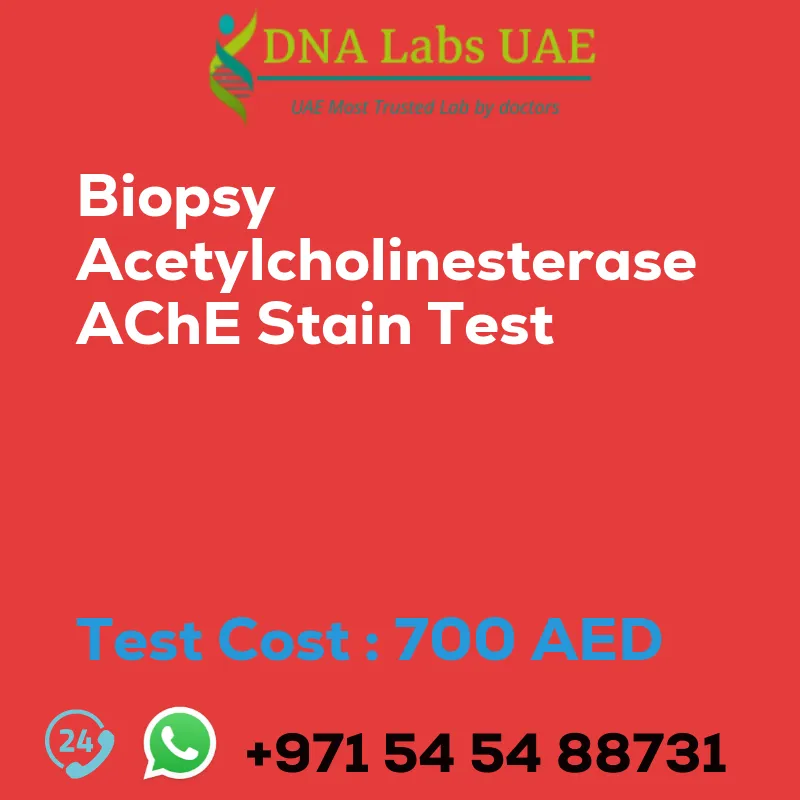BIOPSY ACETYLCHOLINESTERAS E AChE STAIN Test
Test Name: BIOPSY ACETYLCHOLINESTERAS E AChE STAIN Test
Components: Fresh Tissue In Normal Saline
Price: 700.0 AED
Sample Condition: Tissue
Report Delivery: 5 days
Method: Enzyme Histochemistry
Test type: Genetics
Doctor: Gynecologist
Test Department:
Pre Test Information: BIOPSY ACETYLCHOLINESTERAS E (AChE STAIN) can be done with a Doctor’s prescription. Prescription is not applicable for surgery and pregnancy cases or people planning to travel abroad.
Test Details:
Acetylcholinesterase (AChE) stain is a histological staining technique used to visualize the distribution and activity of acetylcholinesterase enzymes in tissues. AChE is an enzyme that breaks down the neurotransmitter acetylcholine at the synaptic cleft, terminating its action and allowing for the repolarization of the postsynaptic membrane.
The AChE stain involves the use of a substrate called acetylthiocholine, which is hydrolyzed by AChE to produce thiocholine. Thiocholine then reacts with a sulfhydryl reagent, such as silver nitrate or Ellman’s reagent, to form a visible precipitate.
This staining technique is commonly used in neuropathology to study the cholinergic system, which is involved in various physiological processes, including memory, cognition, and muscle contraction. By visualizing the distribution of AChE activity, researchers can gain insights into the organization and function of cholinergic neurons in different tissues and organs.
In a biopsy, the AChE stain can be applied to sections of the tissue sample to identify the presence and distribution of AChE activity. This can be particularly useful in diagnosing and studying conditions related to cholinergic dysfunction, such as Alzheimer’s disease, myasthenia gravis, and certain types of tumors.
Overall, the AChE stain provides valuable information about the cholinergic system and its involvement in various physiological and pathological processes, aiding in the diagnosis and understanding of related conditions.
| Test Name | BIOPSY ACETYLCHOLINESTERAS E AChE STAIN Test |
|---|---|
| Components | Fresh Tissue In Normal Saline |
| Price | 700.0 AED |
| Sample Condition | Tissue |
| Report Delivery | 5 days |
| Method | Enzyme Histochemistry |
| Test type | Genetics |
| Doctor | Gynecologist |
| Test Department: | |
| Pre Test Information | BIOPSY ACETYLCHOLINESTERAS E (AChE STAIN) can be done with a Doctors prescription. Prescription is not applicable for surgery and pregnancy cases or people planing to travel abroad. |
| Test Details |
Acetylcholinesterase (AChE) stain is a histological staining technique used to visualize the distribution and activity of acetylcholinesterase enzymes in tissues. AChE is an enzyme that breaks down the neurotransmitter acetylcholine at the synaptic cleft, terminating its action and allowing for the repolarization of the postsynaptic membrane. The AChE stain involves the use of a substrate called acetylthiocholine, which is hydrolyzed by AChE to produce thiocholine. Thiocholine then reacts with a sulfhydryl reagent, such as silver nitrate or Ellman’s reagent, to form a visible precipitate. This staining technique is commonly used in neuropathology to study the cholinergic system, which is involved in various physiological processes, including memory, cognition, and muscle contraction. By visualizing the distribution of AChE activity, researchers can gain insights into the organization and function of cholinergic neurons in different tissues and organs. In a biopsy, the AChE stain can be applied to sections of the tissue sample to identify the presence and distribution of AChE activity. This can be particularly useful in diagnosing and studying conditions related to cholinergic dysfunction, such as Alzheimer’s disease, myasthenia gravis, and certain types of tumors. Overall, the AChE stain provides valuable information about the cholinergic system and its involvement in various physiological and pathological processes, aiding in the diagnosis and understanding of related conditions. |








